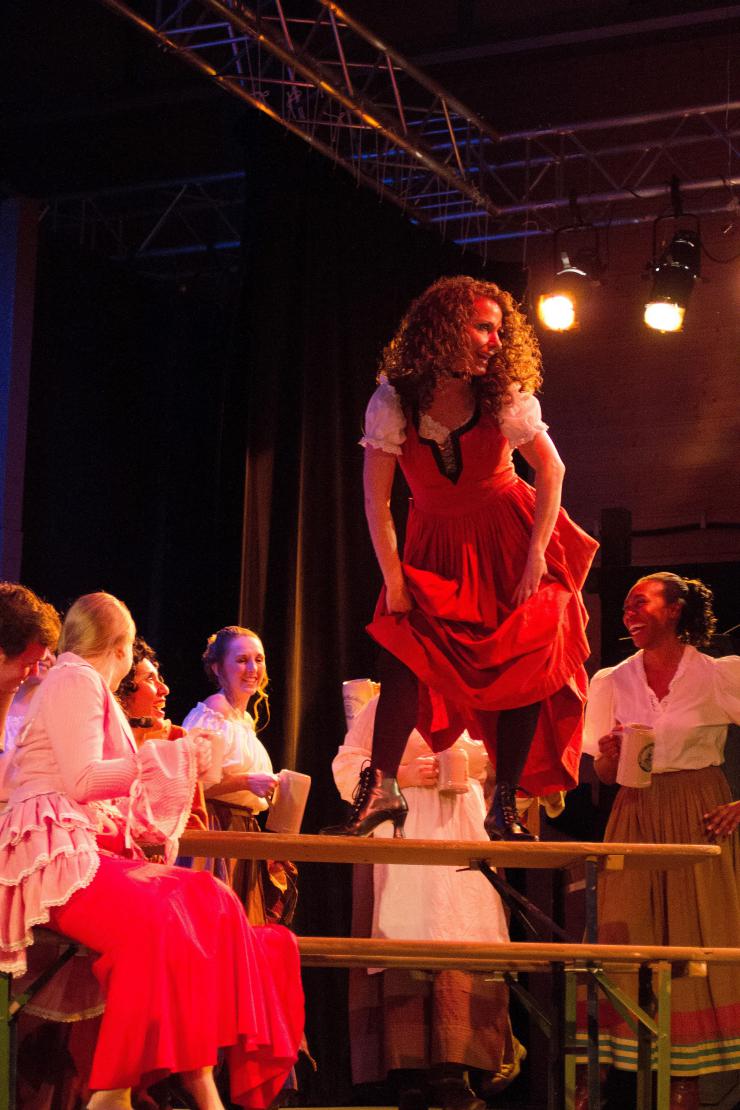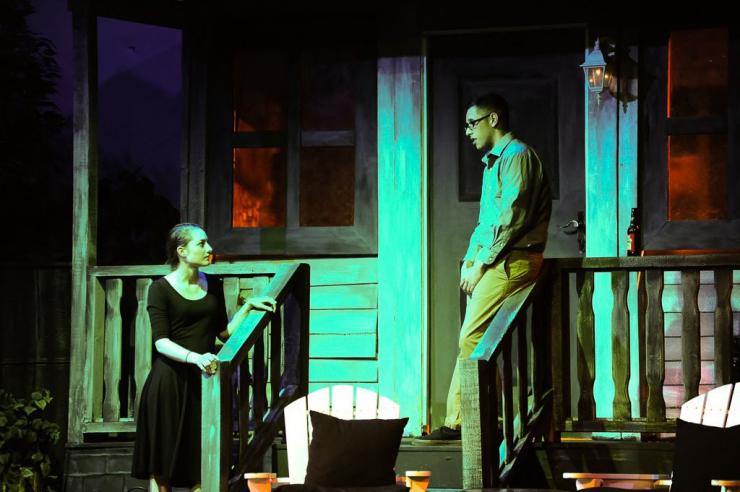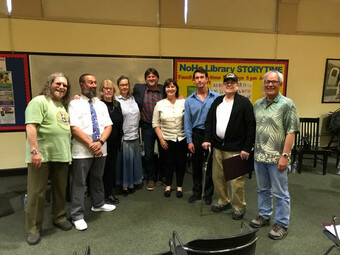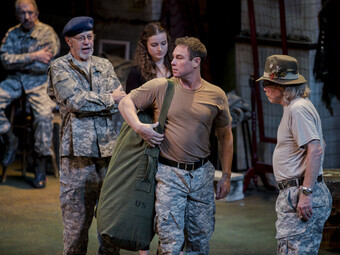The Importance of Military Theatre in Europe
The term “military theatre” usually conjures up images of battlefields on land, at sea, and in air. But real military theatre—with musicals and dramas, actors and actresses—exists for soldiers, their spouses, and their children on Army and Air Force bases in four European countries: Germany, Italy, Belgium, and the Netherlands.
“Entertainment for the soldier, by the soldier” has been part of the US military since the American Revolution. Following the camp shows of the Civil War, military-based theatre was borne during WWI with the involvement of Irving Berlin, who, as a soldier, wrote and performed in Yip Yip Yaphank, an all-soldier musical tribute to the Army. Berlin continued his support of the military during WWII with This Is the Army.
In 1945, the US government hired Margaret E. “Skippy” Lynn to develop entertainment for troops stationed overseas. In the early 60s, she helped create the Army Music and Theater Program; by 1976, according to the Washington Post, it was “the largest producing organization of music and theater in the world,” with more than 25,000 performances per year for a global audience of more than 2.5 million people. Later, Lynn created the US Army Entertainment Program, which today continues to support and coordinate theatrical, music, and entertainment programs at Army bases worldwide. Many famous actors have participated, including Burt Lancaster, Carl Reiner, Dick Van Dyke, Leonard Nimoy, Clint Eastwood, Sammy Davis, Jr., and, recently, 2012 Tony Award winner Nina Arianda.

Today, however, military theatres face many difficulties. Base closures and funding cuts have resulted in several locations in Europe shuttering their doors over the last few years. Army Entertainment Programs in other areas of the world, such as Korea and Turkey, have been shut down. In the continental United States, there are still at least a couple of on-base theatres that continue to function on a purely volunteer basis, but most have been eliminated because off-base community theatres are available for soldiers and their families to join.
However, that option doesn’t exist in Europe for individuals who want to participate in or see English-language theatre. In 2016, a massive campaign in support of the military theatre program by its volunteers, their families, and even theatre and film celebrities saved it. Today, there are eight Army Entertainment Programs and two US Air Force volunteer theatres in Europe, though the program’s long-term future remains uncertain.
Following the camp shows of the Civil War, military-based theatre was borne during WWI with the involvement of Irving Berlin, who, as a soldier, wrote and performed in 'Yip Yip Yaphank', an all-soldier musical tribute to the Army.
Military theatres in Europe are essentially community theatres, housed in everything from repurposed gymnasiums to community centers—any place with a stage. They are part of the American Association of Community Theatre, and, like any other community theatre, they produce a season that includes a mix of musicals, comedies, and dramas for adults and young audiences. Each theatre offers four to eight shows a season, with the shows running from four to twelve performances, and most include strong programs for children’s theatre as well. In fact, children’s shows are some of the most profitable; productions such as Shrek Jr. or James and the Giant Peach are usually sellouts. The profits often subsidize lesser-known but more artistic adult dramas that may not sell as many tickets.
The importance of the children’s program, however, goes beyond the financial rewards. For one, it’s a cheap way for parents to get their kids involved in the performing arts. While some theatres may charge a small fee per child or per family to cover basic costs such as costumes, at others participation is completely free. Beyond that, the children’s program also often introduces children to theatre. Not all military bases have after-school programs with theatre activities, and not all Department of Defense (DoD) Dependent Schools have drama teachers to provide classes. The Army Entertainment Program often is the only opportunity military children have to learn about theatre, and, for some kids, that is a life-changing experience.
Army Major Darwin Maull and his wife Tierra got involved with the Grafenwoehr Performing Arts Center through their children almost immediately after moving to Germany in 2015. Rehearsals became the highlight of the family’s day, and they quickly made new friends. According to Tierra, “In addition to the relationships we have formed, it’s been a great joy to watch my children fall in love with theatre. Not only have they learned acting, singing, dancing, and technical skills, they have learned self-confidence, dedication, leadership, and how to be part of a team.” Last year, Tierra directed her first show—which both her husband and daughter acted in, with her son helping out in the sound booth. The experience was invaluable, something that is felt among many military families.
As in other community theatres, volunteers are the foundation of the Army Entertainment Program. Director of entertainment Dane Winters points out that, from April 2017 to April 2018 (essentially the 2017–18 season), 3,812 volunteers participated in 322 individual performances or entertainment events at the ten theatres. Theatre volunteers are active military personnel, spouses, DoD employees, their kids, and even the occasional local national.
While the entertainment director of each theatre usually sets the season and directs the shows, volunteers are often encouraged to work their way up to directing productions, just as in stateside community theatres. On top of that, they work in virtually all production capacities, such as set construction, choreography, lights and sound, makeup, stage managing, and, of course, acting. Theatre volunteers get to learn new skills or use talents they may not have any other outlet for.
A soldier cast in a play may unexpectedly be deployed and be gone for weeks during rehearsal, forcing the production to either rehearse around him and hope for the best or recast late in the process.
To honor these volunteers and the work of all theatres, the branch of the Army that is in charge of the theatres—Installation Management Command—and the US Army Entertainment Program produce the Tournament of Plays (known as the TOPPERs) for their theatre programs across Europe. Over six to eight weeks, professional theatre adjudicators attend live performances and offer free workshops in each community. At the end of the adjudication period, the judges nominate individuals and shows for over forty-five TOPPERs awards. These awards, which are presented in Germany every April, recognize outstanding achievements in areas such as acting, choreography, costuming, musicianship, directing, youth performance, soldier performance, production, and many others.

Many volunteers are active military personnel, which can create issues that stateside community theatres typically don’t face. For example, a soldier cast in a play may unexpectedly be deployed and be gone for weeks during rehearsal, forcing the production to either rehearse around him and hope for the best or recast late in the process. Even in the short term, soldiers are often kept out in the field without notice and so may miss rehearsals or, worse, actual performances. A military wife in a play may suddenly find her spouse is deployed and she is now solely responsible for her family’s schedule, or a military child may suddenly have to go with their family to a months-long training assignment.
Rehearsal schedules also need to be adjusted for military life in Europe. One of the perks of serving in Europe is that the military encourages soldiers and their families to take advantage of travel opportunities, and there is a long weekend scheduled each month so soldiers can see the continent. Because of this, many directors don’t have regular weekend rehearsals, which can sometimes impact a show’s ability to rehearse enough. The inherent transiency of a military population creates another potential issue. There is constant turnover since most soldiers and their families typically only stay in a duty station for three years. Even the civilian population is somewhat transient, as many DoD employees are covered by the “five-year rule,” which means they cannot stay in one position or place longer than five years. Most military theatres therefore don’t have the ability to cultivate large, stable pools of production and performance talent.
Despite these inherent challenges, the Army Entertainment Program’s theatres in Europe are important to thousands of service personnel and their families. And the men and women who fight for our country, as well as their spouses and children—who are sacrificing in their own way—deserve entertainment that will positively impact their lives while they are overseas. Military life is difficult enough as it is, especially for those serving far from home, so a program that brings as much camaraderie and creativity to a community as theatre does is something to be celebrated.









Comments
The article is just the start of the conversation—we want to know what you think about this subject, too! HowlRound is a space for knowledge-sharing, and we welcome spirited, thoughtful, and on-topic dialogue. Find our full comments policy here
I am one of the local nationals involved with the military theatre in Giessen, Germany. When I was 15 my English teacher took our class to see "The plays's the thing"... I loved the experience and also realizing that all the English I learned at school could now be used :o) I went to see every production for 2 years and then became a volunteer. Ushering, helping at the bar, building sets, singing in the choir and eventually after refusing to go on stage, ended up on there anyway.... and loved it. Giessen being a university town always had many students and other local nationals involved in their productions. When the military left all local volunteers just could not let it die... so we are keeping English language theatre alive as a German verein (friends of the Keller Theatre e.V.) and even celebrated the 60th birthday actually this year. We are currently rehearsing for the opening show of season 2018/2019 ... getting ready to build more treasurable memories :o)
I was born in an Army hospital and raised in the military. However, when I was five years old, we moved into a house where I grew up, and my mother and father lived until their death. My mother had the insight to sign me up for classes in a regional theatre company when I was in fifth grade. I loved it! For the children of the military to have a place to learn and experience the wonders and joy of the theatre is so important and essential to their well-being. I bet being in a production while your daddy or mommie are away soothes them. Also, for the soldiers who are far away from home. And the spouses. I am grateful for those who support this worthy endeavor. It's not easy work, but important work!!
Unmentioned in Ms. Pollard’s article is the value of the Army Entertainment program overseas in providing a positive, meaningful cultural exchange between Americans and the citizens of the country in which those military theaters operate.
I ran two of these theaters – one just outside Tokyo for five years, the other in Wiesbaden, Germany, for eight years – and a significant number of “local national” participants (onstage, backstage, and in the audience) interacted with members of the American military communities…to everyone’s benefit.
In locales where U.S. troops sometimes behave in ways that might easily give America a less than perfect image in the eyes of our military installations’ host nations, the cooperative artistic endeavor that is theater has often gone a long way in improving that image and presenting the U.S. in a constructive, affirmative light.
Thank you. I was stationed in Giessen, Germany during the mid 80's and participated in the base theatre program. Shared the stage with soldiers and German nationals. Such a rewarding experience. Many fond memories!!!
I'm glad you enjoyed the military theater experience! Thank you for your service!
Were you at the Amelia Earhart Theatre? How wonderful that you were able to bring so many German nationals into your productions! Due to security issues at our base, it was sometimes complicated to get German nationals base access, unless they were already employed by the US government and worked on the base.